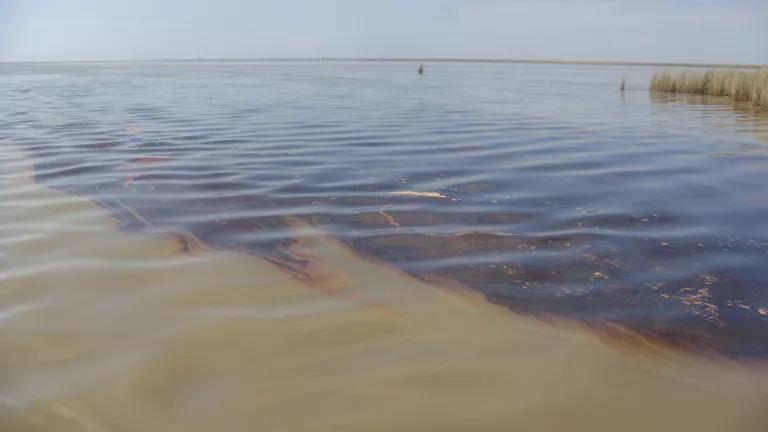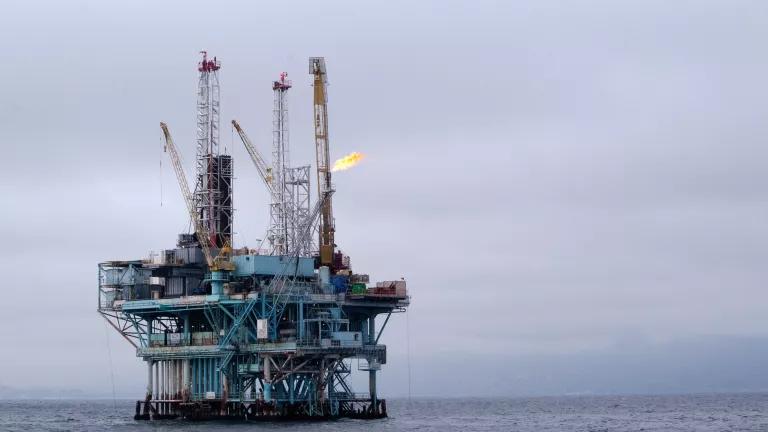Holding Interior to Account on Gulf Oil and Gas Leasing
Continuing to extract oil and gas in the Gulf of Mexico will have a steep price for the environment and coastal communities in the region. That's why NRDC and our partners took BOEM to court.

The U.S. Department of the Interior’s Bureau of Ocean Energy Management (BOEM) is preparing to sell off more than 70 million acres of public waters in the Gulf of Mexico for offshore oil and gas development at the end of March. The agency’s environmental review for the sale was deeply flawed. In issuing these leases, BOEM ignored the effects that such wide-scale industrial development would have on the highly endangered Rice’s whale and other marine life, and the risk of catastrophic oil spills like the Deepwater Horizon disaster. It also failed to consider how locking in decades of oil and gas development through this kind of investment in fossil fuel infrastructure would exacerbate the climate crisis and burden the health of local communities.
Continuing to extract oil and gas in the Gulf of Mexico will have a steep price for the environment and coastal communities in the region. Today, we and our partners took BOEM to court to get the agency to account for that impact.
The Gulf of Mexico—which borders Alabama, Florida, Louisiana, Mississippi, and Texas—has a diverse marine ecosystem that supports an array of ocean life. It provides the sole habitat of Rice’s whale, a species that, with fewer than 100 remaining individuals, may be the most endangered whale on the planet. The Gulf also provides habitat for more than two dozen endangered and threatened bird species and five of the world’s seven species of sea turtle. Finally, the waters of the Gulf help sustain a robust economy: The region produces more than a third of the nation’s domestic seafood supply, and commercial fishing and coastal tourism generate above $40 billion every year.
The region is also a major hub for U.S. fossil fuel production—the Gulf produces 15 percent of the nation’s oil, and the Gulf region houses around 50 percent of U.S. petroleum and (natural) gas refining capacity. Frontline communities in the Gulf region suffer from disproportionate health burdens because of their proximity to fossil fuel infrastructure like refineries and petrochemical plants, and additional development will only add to these burdens.
Opening new areas for development in the Gulf threatens its marine and coastal environments. The Deepwater Horizon disaster deeply harmed the Gulf—many marine mammals, fish, and other species declined after the disaster; nearly a fifth of the desperately endangered Rice’s whale population is thought to have perished outright; coastal and underwater habitats have yet to fully recover. Allowing still more development elevates the risk of another disaster, and it expands harmful activities like seismic blasting that make life difficult for species still struggling to recover.
The climate crisis has already had severe impacts in the area, and extracting more oil and gas from the Gulf will only add to the crisis. Gulf states have been devastated by hurricanes that have killed thousands of people, severely damaged critical infrastructure, and resulted in billions of dollars of damages; and the region is also at risk of coastal flooding and sea level rise, which have already resulted in the relocation of some coastal communities.
In its environmental impact statement, BOEM failed to accurately account for these (and many other) effects that the sale would have. NRDC and our partners are suing BOEM under the National Environmental Policy Act (NEPA) for these failings. NEPA requires federal agencies to fully assess the effects their actions would have, consider alternatives that would be less damaging to the environment, and respond to concerns raised by the public about agency action. We are asking a court to order BOEM to redo its analysis. Ultimately, that could lead the agency to curtail the size of the lease sale, impose additional conditions on oil and gas development, or conclude, as we have based on the best science, that the costs of continued development outweigh the benefits.
The Gulf deserves a better future that no longer depends on oil and gas development poisoning ecosystems and communities. At a time when the region needs support transitioning in an equitable way to a clean energy economy, more oil and gas development will take the region and the country in the wrong direction. If BOEM properly accounts for environmental impacts, the only conclusion it can come to is that the effects and costs of further development far outweigh any benefits.



